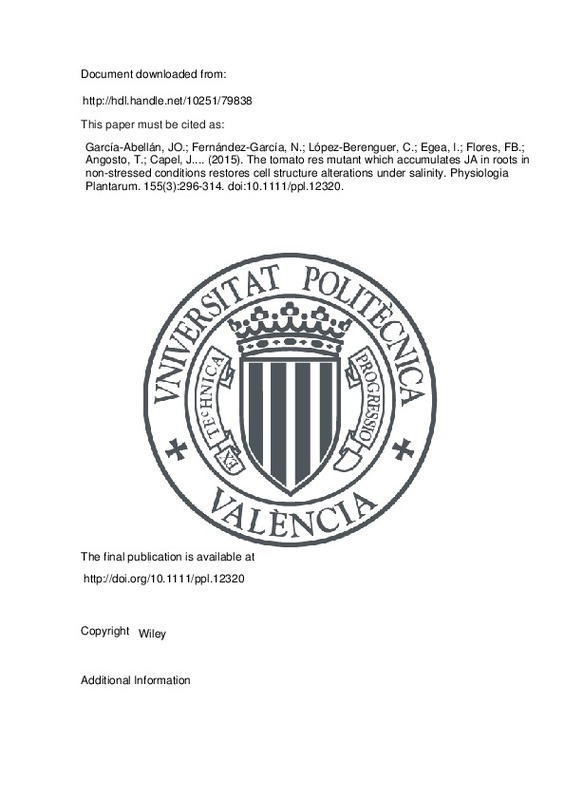JavaScript is disabled for your browser. Some features of this site may not work without it.
Buscar en RiuNet
Listar
Mi cuenta
Estadísticas
Ayuda RiuNet
Admin. UPV
The tomato res mutant which accumulates JA in roots in non-stressed conditions restores cell structure alterations under salinity
Mostrar el registro sencillo del ítem
Ficheros en el ítem
| dc.contributor.author | García-Abellán, José O.
|
es_ES |
| dc.contributor.author | Fernández-García, Nieves
|
es_ES |
| dc.contributor.author | López-Berenguer, Carmen
|
es_ES |
| dc.contributor.author | Egea, Isabel
|
es_ES |
| dc.contributor.author | Flores, Francisco B.
|
es_ES |
| dc.contributor.author | Angosto, Trinidad
|
es_ES |
| dc.contributor.author | Capel, Juan
|
es_ES |
| dc.contributor.author | Lozano, Rafael
|
es_ES |
| dc.contributor.author | Pineda Chaza, Benito José
|
es_ES |
| dc.contributor.author | Moreno Ferrero, Vicente
|
es_ES |
| dc.contributor.author | Olmos, Enrique
|
es_ES |
| dc.contributor.author | Bolarín, María C.
|
es_ES |
| dc.date.accessioned | 2017-04-20T07:19:24Z | |
| dc.date.available | 2017-04-20T07:19:24Z | |
| dc.date.issued | 2015-11 | |
| dc.identifier.issn | 0031-9317 | |
| dc.identifier.uri | http://hdl.handle.net/10251/79838 | |
| dc.description.abstract | [EN] Jasmonic acid (JA) regulates a wide spectrum of plant biological processes, from plant development to stress defense responses. The role of JA in plant response to salt stress is scarcely known, and even less known is the specific response in root, the main plant organ responsible for ionic uptake and transport to the shoot. Here we report the characterization of the first tomato (Solanum lycopersicum)mutant, named res (restored cell structure by salinity), that accumulates JA in roots prior to exposure to stress. The res tomato mutant presented remarkable growth inhibition and displayed important morphological alterations and cellular disorganization in roots and leaves under control conditions, while these alterations disappeared when the res mutant plants were grown under salt stress. Reciprocal grafting between res and wild type (WT) (tomato cv. Moneymaker) indicated that the main organ responsible for the development of alterations was the root. The JA-signaling pathway is activated in res roots prior to stress, with transcripts levels being even higher in control condition than in salinity. Future studies on this mutant will provide significant advances in the knowledge of JA role in root in salt-stress tolerance response, as well as in the energy trade-off between plant growth and response to stress. Guardar / Salir Siguiente > | es_ES |
| dc.description.sponsorship | This work was supported by grant AGL2012-40150-C03 from the Spanish 'Ministerio de Economia'; The Spanish Council of Scientific Research (CSIC) [postdoctoral position from the JAE-Doc programme grant E-30-2011-0443170 conceded to IE and BP]; Spanish 'Ministerio de Economia' [postdoctoral position from the RyC programme grant RYC2010-06369 conceded to NFG]. | |
| dc.language | Inglés | es_ES |
| dc.publisher | Wiley | es_ES |
| dc.relation.ispartof | Physiologia Plantarum | es_ES |
| dc.rights | Reserva de todos los derechos | es_ES |
| dc.subject | DNA insertional mutagenesis | es_ES |
| dc.subject | Domain proteins interact | es_ES |
| dc.subject | Plant stress responses | es_ES |
| dc.subject | Allene oxide cyclase | es_ES |
| dc.subject | Jasmonic acid | es_ES |
| dc.subject | Salt tolerance | es_ES |
| dc.subject | Arabidopsis-thaliana | es_ES |
| dc.subject | Signal-transduction | es_ES |
| dc.subject | Gene-expression | es_ES |
| dc.subject | Nitric-oxide | es_ES |
| dc.subject.classification | GENETICA | es_ES |
| dc.title | The tomato res mutant which accumulates JA in roots in non-stressed conditions restores cell structure alterations under salinity | es_ES |
| dc.type | Artículo | es_ES |
| dc.identifier.doi | 10.1111/ppl.12320 | |
| dc.relation.projectID | info:eu-repo/grantAgreement/MINECO//AGL2012-40150-C03-03/ES/IDENTIFICACION, ETIQUETADO Y ANALISIS FUNCIONAL DE GENES IMPLICADOS EN EL CUAJADO DEL FRUTO DE TOMATE Y TOLERANCIA A LA SALINIDAD EN ESPECIES SILVESTRES RELACIONADAS/ | es_ES |
| dc.relation.projectID | info:eu-repo/grantAgreement/MINECO//AGL2012-40150-C03-02/ES/IDENTIFICACION, ETIQUETADO Y ANALISIS FUNCIONAL DE GENES IMPLICADOS EN EL CUAJADO DEL FRUTO DE TOMATE Y TOLERANCIA A LA SALINIDAD EN ESPECIES SILVESTRES RELACIONADAS/ | es_ES |
| dc.relation.projectID | info:eu-repo/grantAgreement/CSIC//JAE-Doc E-30-2011-0443170/ | es_ES |
| dc.relation.projectID | info:eu-repo/grantAgreement/MINECO//AGL2012-40150-C03-01/ES/IDENTIFICACION, ETIQUETADO Y ANALISIS FUNCIONAL DE GENES IMPLICADOS EN EL CUAJADO DEL FRUTO DE TOMATE Y TOLERANCIA A LA SALINIDAD EN ESPECIES SILVESTRES RELACIONADAS/ | es_ES |
| dc.relation.projectID | info:eu-repo/grantAgreement/MICINN//RYC-2010-06369/ES/RYC-2010-06369/ | es_ES |
| dc.rights.accessRights | Abierto | es_ES |
| dc.contributor.affiliation | Universitat Politècnica de València. Departamento de Biotecnología - Departament de Biotecnologia | es_ES |
| dc.contributor.affiliation | Universitat Politècnica de València. Escuela Técnica Superior de Ingeniería Agronómica y del Medio Natural - Escola Tècnica Superior d'Enginyeria Agronòmica i del Medi Natural | es_ES |
| dc.description.bibliographicCitation | García-Abellán, JO.; Fernández-García, N.; López-Berenguer, C.; Egea, I.; Flores, FB.; Angosto, T.; Capel, J.... (2015). The tomato res mutant which accumulates JA in roots in non-stressed conditions restores cell structure alterations under salinity. Physiologia Plantarum. 155(3):296-314. https://doi.org/10.1111/ppl.12320 | es_ES |
| dc.description.accrualMethod | S | es_ES |
| dc.relation.publisherversion | http://doi.org/10.1111/ppl.12320 | es_ES |
| dc.description.upvformatpinicio | 296 | es_ES |
| dc.description.upvformatpfin | 314 | es_ES |
| dc.type.version | info:eu-repo/semantics/publishedVersion | es_ES |
| dc.description.volume | 155 | es_ES |
| dc.description.issue | 3 | es_ES |
| dc.relation.senia | 304908 | es_ES |
| dc.identifier.eissn | 1399-3054 | |
| dc.identifier.pmid | 25582191 | |
| dc.contributor.funder | Ministerio de Economía y Competitividad | |
| dc.contributor.funder | Consejo Superior de Investigaciones Científicas | |
| dc.contributor.funder | Ministerio de Ciencia e Innovación | es_ES |







![[Cerrado]](/themes/UPV/images/candado.png)

